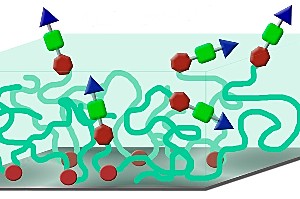Researchers at Technische Universität Darmstadt in Germany are developing thin plastics with the ability to control the properties of materials to which they are attached. The films made of polymers — long, repeating chains of molecules — would contain elements that react to external stimuli, such as light or magnetic fields, and change the underlying substrate.
The cross-disciplinary team in TU Darmstadt’s Center of Smart Interfaces envisions ultrathin films of polymers, as thin as one molecule, that would seal off the underlying material. Chemist Markus Biesalski forsees a host of potential benefits and applications. “A practical implementation of such switchable surfaces is the reversible wetting of surfaces for, e.g., applications involving printing inks,” says Biesalski. “‘Smart’ plastic films on materials to be imprinted will initially optimize the adhesions of printing inks, and later simplify their removal during recycling.”
Other polymers could react to chemical catalysts, or act as sensors that react to specific light wavelengths. Still other polymers could be configured as biosensors, to track pollutants or warn of pathogens.
Still in an early stage, the classes of polymers being studied have structures and chemical compositions that vary widely. One form is solid rods with flexible “tails” on their structures that can link them together forming membranes, while others behave like a ball of yarn or overcooked spaghetti.
Another avenue for investigation is biological materials. Protein molecules could be genetically engineered to act as channels for potassium, calcium, or other ions in cell membranes to be reconfigured into new types of nanoswitches. These nanoswiches would be added to polymers that coat medications, which in turn would react to light or radiation directed at specific locations in the body. The polymers then would dissolve, releasing the medication at the precise point it is needed.
The TU Darmstadt project, called Soft Control: Efficient Switching Utilizing Polymers on Interfaces, is funded over the next three years by a EUR 4.5 million grant from the Hessian State Initiative for Promoting Scientific-Economic Excellence. The research team is also working in collaboration with the German Plastics Institute.
Read more:
- New Process Developed for Thin-Layered Nanomaterials
- University, Company Develop Nanotech Conducting Polymer Film
* * *


 RSS - Posts
RSS - Posts
[…] Read more: University Studying Smart Polymer Film to Control Substrates […]